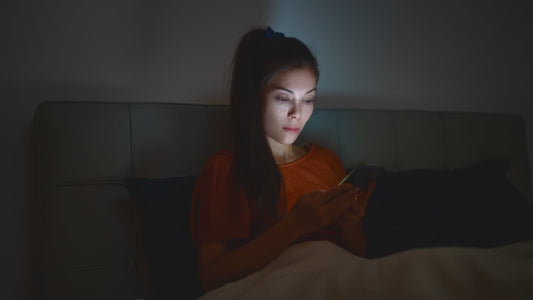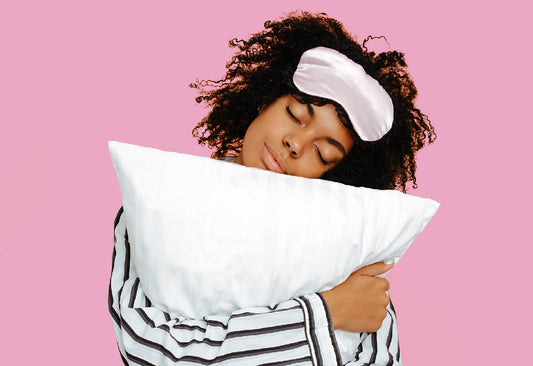We’ve all been there: a late night spent turning from right to left.
There’s nothing worse.
The pressure of needing to fall back asleep so you can get up for work in the morning, only makes it worse.
Sometimes, restless sleep comes out of nowhere. Other times, (if we’re honest) it’s pretty obvious what causes these sleep disturbances. Poor diet, high caffeine intake, stress, anxiety, underlying medical conditions, and poor sleep habits such as inconsistent sleep schedules, use of electronic devices in bed, and late-night eating can all play a part in stopping us from getting the peaceful sleep we crave.
If this sounds like you, you’re not alone. According to the American Academy of Sleep Medicine, 33-50% of adults experience restless sleep.
In this piece, we’re walking you through the most significant contributors to restless sleep. We’re giving you our best ten tips to prevent tossing and turning at night, so you can get a head-start on deep sleep.
Ready to go?
What Causes Restless Sleep?

The odd night of disturbed sleep, whilst inconvenient for the next day, shouldn’t pose any serious long term health risks. But chronic tossing and turning on a regular basis can be a symptom of something bigger.
Often, it’s your body’s way of letting you know something isn’t quite right.
So, what could be the real problem? Poor sleep habits, such as inconsistent sleep schedules and late-night eating, can lead to restless sleep. Here are some of the most significant contributors to restless sleep:
Anxiety
For anyone that struggles with anxiety, sleep disruptions are nothing new. Excessive worry and fear make it difficult to fall and stay asleep. In turn, sleep deprivation worsens anxiety, creating a nasty cycle that can affect both physical and mental health.
People with anxiety often experience mental hyperarousal, which involves an excessive state of alertness and responsiveness to stimuli. This condition is recognized as a major contributing factor to insomnia.
Additionally, individuals with anxiety tend to have higher sleep reactivity, meaning even minor stressors or disturbances can significantly impact their ability to fall asleep and may result in alterations in their overall sleep cycle.(1,2)
Stress
Stress takes a significant toll on the body, both physically and mentally, and can make it more challenging to fall asleep and stay asleep. Chronically high-stress levels increase the stress hormone cortisol, which increases alertness and arousal and makes it hard to fall asleep.(3)
Sleep loss, in turn, alters the HPA axis function and can result in hyperactivation, further complicating the problem.
Poor sleep hygiene
Your sleep habits have a lot to do with how well you sleep. Just like kids, going to bed too early or late can interfere with sleep quality. Poor sleep habits, such as inconsistent sleep schedules, use of electronic devices in bed, and late-night eating, can lead to restless sleep. These habits can disrupt your body's natural sleep-wake cycle, making it harder to fall asleep and stay asleep.
If you’re over or under-tired when you get into bed, it can make falling asleep difficult. The same is true of anyone with an irregular sleep schedule, for example, night shift workers.
Restless leg Syndrome
Restless Leg Syndrome (RLS) is a neurological disorder characterized by an uncontrollable urge to move the legs. This makes it very difficult to fall asleep and can lead to chronic sleep deprivation.
Poor diet
Specific nutrients support a healthy sleep cycle. Not getting enough can have a big impact on sleep quality.
Nutrients from food play a huge role in the production of melatonin, your sleep hormone, and other neurotransmitters that regulate sleep.
Studies find that foods containing melatonin or promoting the synthesis of it via the availability of tryptophan, as well as foods containing vitamins and minerals needed as co-factors and activators in the synthesis of melatonin, may influence levels of the hormone and directly affect sleep quality.(4)
If you want to protect yourself against nutrient shortfalls, consider investing in a good multivitamin like Performance Lab NutriGenesis Multi.
SHOP PERFORMANCE LAB® NUTRIGENESIS®
NutriGenesis® Multi delivers advanced nutrients to restore essential vitamins and minerals that may be missing from your diet.
Sleep environment
If you want to sleep well, you need an environment conducive to sleep. For example, thermal regulation is a huge factor that can affect sleep.
Heat or cold exposure can result in increased wakefulness, decreased rapid eye movement sleep, slow wave sleep, and altered sleep stages.(5)
Additionally, brightness can also influence sleep via melatonin production. Light from external sources or blue light from electronic devices interferes with melatonin production.
When melatonin levels aren’t high enough to support sleep onset, it can lead to restlessness where you’re tossing and turning, unable to fall asleep.
Underlying health conditions
Pre-existing medical conditions like sleep apnea, and insomnia can make it harder to fall asleep and stay asleep.
However, note that dealing with the actual health condition is most likely the most effective route to address sleep disruptions. So if you think this is you, consult your healthcare provider to get it under control.
How To Fall Asleep More Easily

Several factors contribute to sleep quality, and sometimes, those details slip under the radar, and we forget the impact they have. But it’s important. Unlike restless sleep, which leaves your body tense and your brain active, deep sleep allows the brain to process and consolidates memories, facilitating learning and information retention.
This stage also triggers the release of growth hormones, which are essential for tissue repair and muscle growth. Deep sleep helps in detoxifying the brain by clearing out waste products accumulated during waking hours.
Related Post: Best Nighttime Supplement for Muscle Growth
So whether it’s one coffee cup too much or the heat is a bit too high, getting enough is key.
For every problem, there is a solution, and with a bit of attention to what could be causing you to toss and turn, it’s easy to get the sleep you deserve. By following these tips and solutions, you can sleep soundly and improve your overall sleep quality.
1. Try relaxation exercises

For anyone who deals with anxiety, muscle tension, or ruminating thoughts before bed, relaxation exercises can go a long way to helping ease the body and mind and prepare you for sleep. These exercises can help you sleep soundly by calming both the body and mind.
Meditation has been shown to be beneficial for sleep. Research has found that it can improve insomnia and sleep quality and reduce daytime disturbance in people with chronic insomnia.(5, 6)
How? Meditation and mindfulness trigger the body’s relaxation response, downregulating the sympathetic nervous system and stimulating the parasympathetic nervous system.(7)
2. Cut back on stimulants

When looking for a burst of energy, stimulants like caffeine might be a good option. But these aren't helpful if you want to get a good night's sleep.
Caffeine is classified as an adenosine receptor antagonist that enhances arousal and fights fatigue; adenosine levels naturally rise in the brain throughout the day, helping to support tiredness and sleep onset in the evening.
However, because caffeine blocks adenosine from binding in the brain, it prevents it from binding and inhibits fatigue.(8)
And because caffeine has a half-life that can last up to nine hours after consumption, a cup midday has the potential to interfere with sleep, especially if you metabolize caffeine slowly.
If you’re going to consume caffeine, limit consumption to 1-2 cups per day, and avoid drinking it after about 2 pm.
3. Invest in a new mattress

Often, tossing and turning at night can be from discomfort due to a bad mattress. If you want peaceful, good-quality sleep, you need a mattress that offers good neck and spinal support.
Studies find that a medium-firm mattress with adjustable firmness can promote better comfort, proper spinal alignment, and better quality sleep.(9)
If aches and pains are your kryptonite, the surface you sleep on can make a big difference. A 2015 study found that people who used a medium-firm memory foam mattress had less pain and fell asleep faster.(10)
4. Follow a consistent sleep schedule

Being consistent about your bedtime and wake-up time is part of practicing good sleep hygiene.
Humans operate surprisingly well on consistency, and going to bed at the same time—or around the same time—daily allows your body to feel awake and tired at roughly the same time each night. Studies find that irregular bedtime schedules lead to poorer sleep quality.(11)
Following a consistent sleep schedule can help you sleep soundly by regulating your body's internal clock.
5. Use a weighted blanket

A weighted blanket works wonders for anyone who struggles with restlessness at night. They use firm, controlled pressure to induce calmness.(12)
Research suggests that weighted blankets improve the ability to fall asleep, stay asleep and support relaxation during the day.(13)
6. Set an electronics curfew

Removing your electronic devices from the bedroom, or at least limiting their use before bed, can help to support sleep by facilitating the release of melatonin. Blue light from devices naturally suppresses melatonin and triggers cortisol release.(14)
Essentially, blue light exposure in the evening tricks your brain into thinking it’s still daytime, which disrupts your circadian rhythm and leaves you feeling alert instead of tired. Poor sleep habits, such as using electronic devices in bed, can interfere with sleep quality and contribute to restless sleep.
To avoid this, put your electronics away 2-3 hours before bed and keep them outside your room. If you have to use them, install light-altering software to minimize the harmful effects.
7. Reduce external light

Have you ever tried falling asleep in a bright room? It’s next to impossible. As with electronic devices, fluorescent light and daylight can have the same effects.
To avoid having light interfere with your sleep, invest in blackout curtains or wear a sleep mask that fully covers your eyes.
8. Exercise regularly

Our bodies are designed to move, and regular physical activity not only supports a healthy body but it also supports sleep.
Studies consistently find that exercise promotes better sleep efficiency and duration, regardless of the type and intensity.(15) If you struggle to fall asleep, make it a goal to get out for a 15-20-minute walk before bed!
9. Sip herbal teas

Herbal teas are a fantastic choice for supporting sleep.
Chamomile, lavender, passionflower, and valerian all have properties that promote sleep, acting as natural sedatives to reduce stress, relieve anxiety, and induce calmness.
10. Take a natural sleep supplement

There are also plenty of natural supplements that provide sleep-supportive herbs and nutrients. Although melatonin is widely available in supplemental form, the dose is often significantly higher than needed, leaving you with serious next-day grogginess and fatigue.
Instead, opt for something like Performance Lab® Sleep, which supplies low-dose natural melatonin derived from Montmorency tart cherries, L-tryptophan, and three types of magnesium. These natural sleep supplements can help you sleep soundly by providing the necessary nutrients and herbs.
Experience the world’s most advanced natural sleep formula.


Final Thoughts
Getting the restful sleep you need can be challenging. And if you're struggling to work out why you're not sleeping, keeping a sleep journal is a good way to track your mood, habits, hormones, diet and stress levels.
While it may seem overwhelming to implement all of these tips at once, take it slow—start with one or two, and build up slowly to a sleep-supportive lifestyle.
-
Kalmbach DA, Cuamatzi-Castelan AS, Tonnu CV, et al. Hyperarousal and sleep reactivity in insomnia: current insights. Nat Sci Sleep. 2018;10:193-201.
-
Kalmbach DA, Anderson JR, Drake CL. The impact of stress on sleep: Pathogenic sleep reactivity as a vulnerability to insomnia and circadian disorders. J Sleep Res. 2018;27(6):e12710.
-
Hirotsu C, Tufik S, Andersen ML. Interactions between sleep, stress, and metabolism: From physiological to pathological conditions. Sleep Sci. 2015;8(3):143-152.
-
Peuhkuri K, Sihvola N, Korpela R. Dietary factors and fluctuating levels of melatonin. Food Nutr Res. 2012;56:10.3402/fnr.v56i0.17252.
-
Ong JC, Manber R, Segal Z, Xia Y, Shapiro S, Wyatt JK. A randomized controlled trial of mindfulness meditation for chronic insomnia. Sleep. 2014;37(9):1553-1563.
-
Barrett B, Harden CM, Brown RL, Coe CL, Irwin MR. Mindfulness meditation and exercise both improve sleep quality: Secondary analysis of a randomized controlled trial of community dwelling adults. Sleep Health. 2020;6(6):804-813.
-
Luberto CM, Hall DL, Park ER, Haramati A, Cotton S. A Perspective on the Similarities and Differences Between Mindfulness and Relaxation. Glob Adv Health Med. 2020;9:2164956120905597.
-
Ribeiro JA, Sebastião AM. Caffeine and adenosine. J Alzheimers Dis. 2010;20 Suppl 1:S3-S15.
-
Radwan A, Fess P, James D, et al. Effect of different mattress designs on promoting sleep quality, pain reduction, and spinal alignment in adults with or without back pain; systematic review of controlled trials. Sleep Health. 2015;1(4):257-267.
-
Ancuelle V, Zamudio R, Mendiola A, et al. Effects of an adapted mattress in musculoskeletal pain and sleep quality in institutionalized elders. Sleep Sci. 2015;8(3):115-120.
-
Kang JH, Chen SC. Effects of an irregular bedtime schedule on sleep quality, daytime sleepiness, and fatigue among university students in Taiwan. BMC Public Health. 2009;9:248.
-
Reynolds S, Lane SJ, Mullen B. Effects of deep pressure stimulation on physiological arousal. Am J Occup Ther. 2015;69(3):6903350010p1-6903350010p5.
-
Bolic Baric V, Skuthälla S, Pettersson M, Gustafsson PA, Kjellberg A. The effectiveness of weighted blankets on sleep and everyday activities - A retrospective follow-up study of children and adults with attention deficit hyperactivity disorder and/or autism spectrum disorder (published online ahead of print, 2021 Jun 29). Scand J Occup Ther. 2021;1-11.
-
Lockley SW, Brainard GC, Czeisler CA. High sensitivity of the human circadian melatonin rhythm to resetting by short wavelength light. J Clin Endocrinol Metab. 2003;88(9):4502-4505.
-
Dolezal BA, Neufeld EV, Boland DM, Martin JL, Cooper CB. Interrelationship between Sleep and Exercise: A Systematic Review (published correction appears in Adv Prev Med. 2017;2017:5979510). Adv Prev Med. 2017;2017:1364387.














